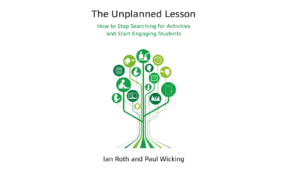Book Review: Reflections on Language Teacher Identity Research
Identity issues for language teachers are like layers of an onion: the outer layer is personal and professional identity for educators in general, next inwards is language teacher identity as such, then we move further inside to the layer of English language teacher identity with the innermost layer being that of non-native English speaker teachers’ identity.
Remarkably, the one at the heart of the onion is roughly about four times as big as the next: the ratio between native and non-native English teachers is about one to four. This means that many millions of English teachers speak English as an additional language over and above their native tongue (and often other languages that they might speak).
As a Non native English teacher myself, I have always been interested in how non-native English speaker teachers deal with identity issues. The most important aspects are often how competent and proficient we are in English, and how far we identify ourselves with the target culture. These concerns have changed considerably in the past decades; the gist of the matter is that proficiency (and pronunciation) has taken on a different dimension (the global perspective) and the target culture has changed as well: it is not so much British or American culture that we are aiming to teach but a global view: our students need to be able to understand different varieties of English, project their local culture in this global language and comprehend speakers coming from geographical locations that are far beyond the core English-speaking countries (US, Canada, Australia, New Zealand, Britain and Ireland).
Language teacher identity research is still an up and coming niche sector of academia but more and more qualitative research is being carried out in this field. The latest development is a comprehensive volume entitled “Reflections on Language Teacher Identity Research” edited by Gary Barkhuizen, who has drawn on the personal research experience of 41 contributors, asking them to consider the conceptual understanding of language teacher identity (LTI) and the methodological approaches used to investigate it. The result is a kaleidoscope of views and perspectives of both native and non-native English teachers and teacher educators, roughly in equal measure. The precise data are hard to establish given the extraordinary career paths of many of the contributors.
It goes without saying that I was most interested in how my NNEST colleagues (Non-Native English Speaker Teachers – usually pronounced as en-NESTs) perceive their identity. I was astonished to find that Suresh Canagarajah, whose books and articles on academic writing and global Englishes have provided intellectual nourishment for my own practice, can still recall incidents from his early career when his authority and expertise were questioned because of his linguistic (non-native), national (Sri Lankan) and racial (Asian) identities. In his essay, he confirms an aspect that is often mentioned when looking at the strengths of non-native English speaker teachers, namely, the fact that native-speaker teachers often do not understand the challenges students face when having to write in English at academic level. I can safely add that many times it’s not even the language per se that gets in the way, but the differences in the literary tradition: English is straightforward and even laconic, while Spanish speakers, for example, need to leave behind the roundabout, flowery way of saying things, which sometimes creates a feeling that they are writing in a simplistic or unsophisticated manner.
Another aspect that seems to be an overarching theme is expounded in Thomas Farrell’s contribution entitled “Who I am is how I teach”: Reflecting on language teacher professional role identity. Farrell calls himself a “reflective-professional language educator”, who takes a constructivist approach to his research and encourages his students to think independently and critically. A number of authors emphasize that their own personal and professional identity shape what and how they teach adding that once they move on and become teacher educators, their influence spreads by a ripple effect.
From my own professional experience, I can confirm that reflection is key and also that “action mode” is a lot more useful than “lecture mode”. Last year I was running teacher training seminars for colleagues who were preparing to teach academic writing to incoming Master’s students. “How can you teach academic writing if you yourselves don’t do any academic writing at all in English?” was my question, followed by an authentic academic writing activity, whereby my colleagues approached print and online EFL outlets and offered to write book reviews (a realistic task, if I may say so). The results surpassed my highest expectations: two book reviews and a modest article on the experiment itself were the immediate results and a book on NNEST identity as well as a short summary of the research results in an indexed paper (TexTESOL) were also published.
Returning to the volume on LTI, the wealth of rich data and thick description is truly astonishing. Even though the 41 articles are structured in the same way, the professional profiles and the intellectual focus of the writers are as varied as their origins and the academic institutions they work for. Richard Donato and David Block provide an account of and reflection on their own journey of becoming language teaching professionals. Manka Varghese and Brian Morgan emphasize the social justice perspective and critical social practice. Several authors (e. g., Yueting Xu and Simon Borg) treat the subject of how teachers become researchers and what research may imply for their identity. The outcomes, namely, becoming a more confident and more reflective practitioner as well as gaining a lot of satisfaction and even professional acknowledgement through research, prove that this often neglected area of continuous professional development needs to be nourished and supported.
The editor asked the contributors to suggest topics for future research, and if I was an EFL professional in search of a PhD topic, I would seriously look at how these internationally renowned and productive authors, many of them working as thesis directors, lay out the pathways for future research. Barkhuizen himself provides an excellent overview of the topics worth considering. Among the fourteen strands, there are some that resonate especially strongly with me: the interface between LTI, classroom practice and critical pedagogy; multilingual contexts, and especially, language learning histories and LTIs (auto- or dual, juxtaposed ethnographic biographies of native and non-native speakers come to mind), as well as transformative research that I understand as bringing about change both for the expert teacher conducting the research and his/her environment as well as the academic field the project is rooted in.
Altogether, this is a timely volume written by contributors whose experience and professional integrity place them among the best practitioners of ELT and related research. An intellectually satisfying and thought-provoking book to be read by all of us – native or non-native.




